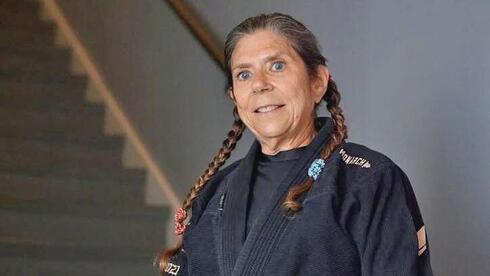Lori Rush, a 67-year-old single woman from Jerusalem, made aliyah from the United States, where she built a decades-long career in cybersecurity.
Raised in New Jersey, she grew up with a brother who made aliyah and a sister in Florida, her mother a homemaker and her father working for El Al. She learned Hebrew at a Jewish school and studied prayers but never considered moving to Israel when she was younger.
Rush’s professional journey took her from New York, where she managed client accounts at Network General, to a five-year stint in Australia, then California. From age 60 until retirement, she worked at Palo Alto Networks, founded by Nir Zuk, selling cybersecurity solutions to major corporations. “I had a long career in cybersecurity and information security,” she said.
A lifelong athlete, Rush played tennis in her 30s and lifted weights for a decade after 40 until boredom set in. At 51, she ventured into martial arts at a gym, discovering jujitsu. Training with instructors, she progressed steadily, earning a black belt three years ago despite most peers being 20-40 years younger.
“It was tough, but I love challenges,” she noted. In 2022, she founded Chai Jitsu, a nonprofit teaching Jewish children jujitsu for physical and mental strength, but closed it last October after making aliyah, realizing the distance hindered oversight.
Her decision to move stemmed from a jarring experience. A Muslim training partner in the U.S., friendly for years, turned cold after October 7, 2023, asking an Iranian teammate, “Why are you friends with this Jewish Rush?”—though the Iranian defended her. “It was a shock. October 7 was a wake-up call, like a modern Kristallnacht. I knew I had to make aliyah,” she said. Rush made aliyah through Nefesh B’Nefesh, with support from the Ministry of Aliyah and Integration, the Jewish Agency and KKL, receiving assistance in housing, banking and social activities.
“I didn’t truly understand what home meant until I got here. Israel is modern, with great people, food, entertainment and fashion. Strangers say, ‘Take my number, call if you need help,’” she shared. She noted some rudeness but finds it manageable.
Even during the war with Iran, she never considered returning to the U.S., vowing, “I think I’ll stay in Jerusalem forever. This is where God called me to, where I need to be.” Now, she trains in jujitsu, volunteers at the Jerusalem Institute for the Blind and walks her dogs. “Despite the situation, there’s no safer place than Jerusalem and Israel,” she said.
When asked about American habits Israel should adopt, she suggested:“Keeping distance on the street.” Public transport remains an adjustment she struggles with, while she misses Amazon’s fast deliveries. Her favorite spot? “My neighborhood, Mishkenot Ha’uma in Jerusalem.”
